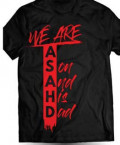DJ Khaled Sues Over Use of His Son’s Name
By Jennifer E. RothmanJune 12, 2018

Last week Khaled M. Khaled, known popularly as DJ Khaled, and the company ATK Entertainment filed a lawsuit objecting to the alleged uses of his son’s name by a clothing company. The complaint (as resubmitted yesterday) alleges violations of trademark law, right of publicity and privacy laws (under N.Y. Civil Rights Law §§50-51), and state and federal unfair competition laws.
DJ Khaled’s son, Asahd Tuck Khaled, is approximately 18 months-old. He was born in October of 2016. At approximately three months of age, Asahd was given his own Twitter handle and has more than 47,000 followers. Apparently this helped catapult him to "best baby"-of-2017 status, as chosen by Cosmopolitan magazine.
Khaled accuses the defendants of being “trademark pirates” trying to profit off Khaled’s and his son’s fame. Khaled specifically objects to Curtis Bordenave and his company, Business Moves Consulting (BMC) allegedly using his son’s name on clothing. Khaled also likely filed suit to counter BMC’s efforts to register the following marks: “ASAHD COUTURE,” “ASAHD,” “A.S.A.H.D.A. A SON AND HIS DAD,” and “WE THE BEST LIFESTYLE.” Khaled is allegedly known for using the catchphrase “We the Best,” and holds a number of registered marks for this catch phrase, as well as for “DJ KHALED.” The complaint raises the concern that the defendants might try to block Khaled & Asahd from using their own names and marks.
Of particular interest to me, are the IP claims revolving around Khaled’s son. Khaled’s complaint contends that Asahd, being born to a successful entertainer and celebrity, became “instantly famous” upon his birth in October 2016―suggesting that at the time of birth his son became a valuable trademark that his parents could use and enforce against others.
The complaint highlights that the child was given an unusual and “distinctive” spelling of his name (rather than the traditional “Assad”). This choice apparently was made to further the ability to use him as a trademark. Notably, the defendants have not used the child’s full name, “Asahd Khaled,” or "Asahd Tuck Khaled," but instead only "Asahd" alone. This makes it more challenging for Khaled to establish that the reference is to his son. This undoubtedly is why the complaint focuses on the distinctiveness of the spelling and the immediate fame upon birth.
Notably, the baby’s parents transferred Asahd’s right of publicity to a company ATK Entertainment at some point during his infancy. They allege this company was formed to protect Asahd’s interests, and they claim it is “run separately from their own business affairs”―although they do not say by whom. If this transfer was lawful, this means that ATK holds all the rights to control Asahd’s name, likeness, and voice, among other aspects of his identity. (The transfer appears to have taken place under Florida’s laws.)
DJ Khaled’s motives in transferring his child’s right of publicity to this corporation may have been to protect him. But it also seems to directed at profitting from the child financially―the complaint highlights that numerous uses and planning directed at profiting from the child’s identity.
I do not know the terms under which Asahd's right of publicity was transferred, or the structure of the corporation ATK. It is possible, however, that the corporation could be structured without guaranteeing Asahd any money earned by using his identity. If there is no reversion provision or express provision that Asahd will gain control back of his right of publicity, then this corporation will have ownership and control over Asahd’s own name, likeness, and voice even once he reaches 18. If there is no express limit on future transfers, ATK could potentially sell ownership of Asahd’s identity to an entirely unrelated company.
It is deeply troubling to turn people into trademarks at the time of birth, and to transfer the rights to their identities to corporations (potentially forever) before they can even walk or talk. These are chilling prospects that simply should not be allowed. (For more on my concerns on such transferability see Chapter Six of my book, The Right of Publicity: Privacy Reimagined for a Public World; my article, The Inalienable Right of Publicity; and a recent op-ed on the topic.)
Putting aside these concerns, if the defendants were confusing consumers or using deception to disrupt business deals that DJ Khaled was trying to make, as the complaint alleges, they may be liable. If Khaled's lawyers have not filed oppositions with the PTO over the defendants' applications, they should obviously do so.
The complaint was filed in federal district court in New York, and includes New York state claims. Khaled and his company, ATK Entertainment, however, are both based in Florida. The defendant and his company are located in Texas. The complaint alleges that many of the wrongful acts, however, took place in New York State.
